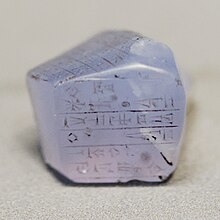Nazi-Maruttash
| Nazi-Maruttaš | |
|---|---|
| King of Babylon | |

Irregular block of chalcedony with votive inscription of Nazi-Maruttaš in the Louvre
|
|
| Reign | 1307–1282 BC |
| Predecessor | Kurigalzu II |
| Successor | Kadašman-Turgu |
| House | Kassite |
Nazi-Maruttaš, typically inscribed Na-zi-Ma-ru-ut-ta-aš or mNa-zi-Múru-taš, Maruttaš (a Kassite god synonymous with Ninurta) protects him, was a Kassite king of Babylon ca. 1307–1282 BC (short chronology) and self-proclaimed šar kiššati, or “King of the World,” according to the votive inscription pictured. He was the 23rd of the dynasty, the son and successor of Kurigalzu II, and reigned for twenty six years.
His reign can be seen as the peak of the Kassite Dynasty's prominence and subsequently Kassite culture declined, exemplified by his successful military campaigns against Assyria and Elam, the glyptic style of cylinder seals, the literature inspired by him (Hemerology for Nazi-Maruttaš) and his appearance in the period piece Ludlul bēl nēmeqi, which was set during his reign.
Nazi-Maruttaš faced a growing threat from the ascendancy of Assyria under Arik-den-ili and his successor Adad-Nīrāri I. The containment of Assyria was conducted through a strategy of flank-attacks supported by his agents, eastern hillmen such as the Gutians, in a protracted war, avoiding a full frontal assault. Under Arik-den-ili, he seems to have had the upper hand, because Adad-Nīrāri, who styles himself “King of the Universe”, later recounts that “my father could not rectify the calamities inflicted by the army of the king of the Kassite land” in a contemporary Assyrian epic.
He is mentioned in the Synchronistic Chronicle as having fought a battle with Adad-Nīrāri's forces at "Kār-Ištar of Ugarsallu". However, the Assyrians won a complete victory over the Babylonians in this battle, plundering their camp and seizing the royal standards, thereby acquiring territory from them and causing the Assyro-Babylonian boundary to be adjusted southward. The conflict is fondly remembered in the Tukulti-Ninurta Epic, in its recounting of past Assyro-Babylonian conflicts, where he says, “And like Adad – I will send a devastating flood upon your camp!”
...
Wikipedia
